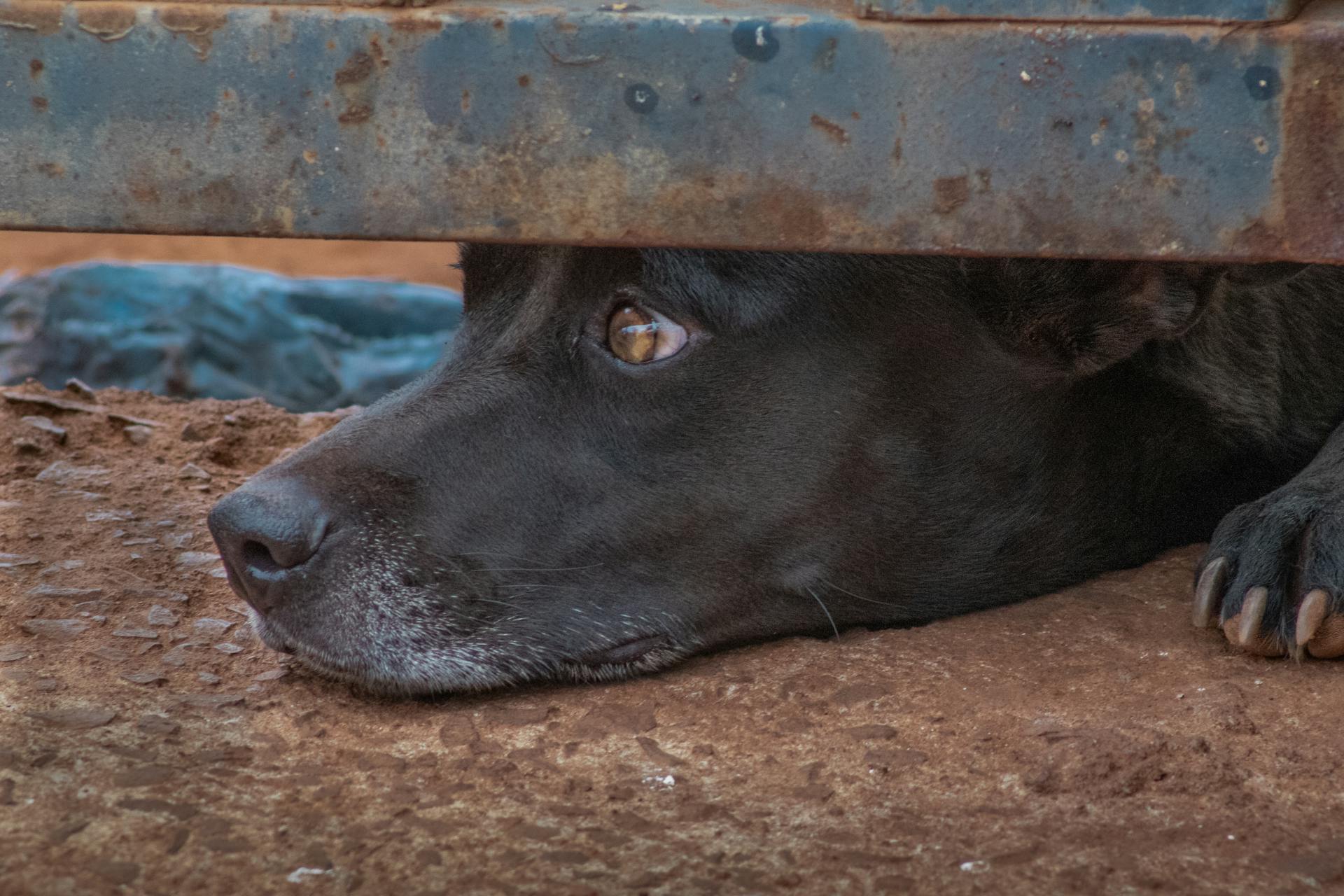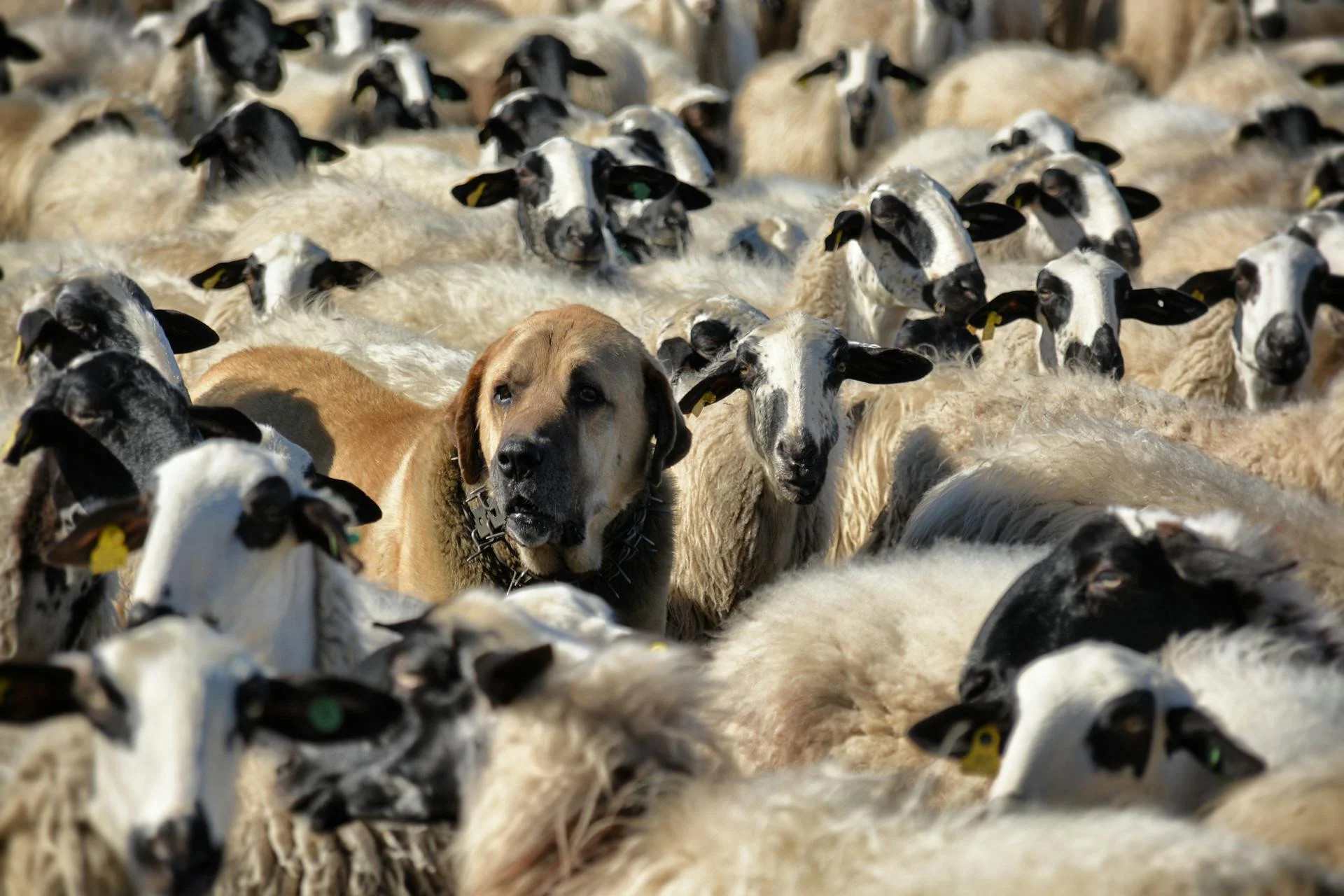
As our furry friends age, we may notice some changes in their behavior. Some old dogs can become more anxious or fearful, leading to increased barking or whining.
Older dogs may also experience cognitive decline, which can cause them to become disoriented or forget familiar commands.
A common change in old dog behavior is a decrease in physical activity, which can be due to joint pain or reduced mobility. This can be frustrating for owners who are used to their dog's energetic playtime.
To adapt to these changes, it's essential to tailor your approach to your dog's new needs. For example, short, gentle walks may be more suitable for older dogs than long, strenuous hikes.
A fresh viewpoint: Alpha Canine Behavior
Why Do Old Dogs Behave Differently?
Old dogs behave differently for a variety of reasons. Cognitive decline can lead to confusion, anxiety, and pacing, particularly at night. This is often a sign of canine cognitive dysfunction, also known as 'Dogzheimers'.
Pain is another common cause of behavioral changes in senior dogs. Osteoarthritis and other joint problems can cause discomfort and pain, leading to restlessness and pacing. Your dog may move around in an attempt to find relief from the pain.
Changes in sleep patterns are also common in senior dogs. Some may experience sleep disturbances, while others may become more irritable or reluctant to engage in activities due to discomfort or pain. This can be a sign of cognitive decline or other medical conditions.
As your dog ages, their senses may begin to wane, leading to anxiety about their surroundings. They may become more clingy and appreciate familiar things and a stable routine. This is normal and can be managed with patience and understanding.
Here are some common behavioral changes to expect in senior dogs:
- Cognitive decline or senility, known as canine cognitive dysfunction (CCD)
- Pain or discomfort due to arthritis or other conditions
- Changes in sleep patterns, such as insomnia or restlessness
- Increased anxiety or fearfulness
- Changes in appetite or eating habits
- Increased vocalization or barking
- Changes in elimination habits, such as accidents in the house
It's essential to consult with your veterinarian to rule out any underlying medical conditions that may be causing these changes. They can help determine the best course of action to manage your dog's behavior and ensure their comfort and well-being.
Common Issues in Older Dogs
As dogs age, they can develop a range of issues that affect their behavior and overall health. Medical conditions such as arthritis, cataracts, hormonal issues, kidney disease, and cancers are more common in senior dogs.
Their immune system weakens with age, making them more susceptible to illnesses and diseases. Keeping up with monthly preventatives and following the recommended vaccine schedule is crucial to keep parasites at bay.
Older dogs can also become irritable and aggressive due to fear-based aggression caused by cognitive decline, pain, hearing loss, or vision loss. This can be a challenging transformation for both the dog and their owner.
Urinary incontinence is another common issue in senior dogs, caused by factors such as kidney infection, urinary tract infection, hormone changes, Cushing's syndrome, diabetes, neurological disease, stress, anxiety, or loss of cognitive function.
You might like: Old Friends Senior Dog Sanctuary
Are More Aggressive?
Older dogs can become irritable and more aggressive due to fear-based aggression caused by cognitive decline, pain, hearing loss, or vision loss.
As your dog ages, you may notice he growls when touched or snaps when rambunctious children or puppies are nearby.
A visit to your dog's veterinarian is the first step in determining the cause of his aggression, which may require medications if there's an underlying illness.
Petting your dog can cause pain in sore joints, so it's essential to pay attention to where touching hurts him and avoid those areas.
Sticking to a familiar daily routine and minimizing chaos can help reduce your dog's stress and anxiety.
Suggestion: How Old Is Too Old to Clip a Dog's Ears?
Accidents in the House
Accidents in the House can be a challenging issue to deal with, especially if you're not sure what's causing them. Senior dogs can experience urinary incontinence due to various factors, including kidney infection, urinary tract infection, hormone changes, Cushing’s syndrome, diabetes, neurological disease, stress, anxiety, or loss of cognitive function.
Seeing your vet to properly diagnose your senior dog's urinary incontinence is crucial, as it can help identify the underlying cause. By addressing any major changes in your dog's life that may have caused stress or anxiety, you can potentially alleviate the issue.
As your dog ages, you may notice behavior changes, which can be painful to watch. These changes can be a sign of underlying medical issues, such as kidney infection or urinary tract infection.
Managing symptoms and offering comfort can make a big difference in your dog's quality of life. By understanding the root causes of their behavior changes, you can seek early medical interventions and provide the necessary care.
It's essential to be patient and kind to your dog as they navigate these changes, as they need your love and support more than ever.
Discover more: Certified Behavior Consultant Canine
Physical Changes in Older Dogs
As your dog ages, you'll notice some significant physical changes that can impact their quality of life. Senior dogs tend to gain weight unless their food is adjusted accordingly, which can lead to a range of health issues.
Weight gain is a major concern, as it increases the risk of arthritis, diabetes, and heart disease, making everyday activities more challenging for your dog. Regular exercise, though, is still essential to prevent weight gain and maintain their mobility.
It's normal for senior dogs to slow down, but if they seem stiff or have trouble with daily activities, it's worth consulting with a veterinarian to rule out any underlying medical issues. Some pets may suffer in silence, so being observant is key.
Here are some common physical changes you might notice in older dogs:
- Weight gain or loss, which can be a sign of a medical issue
- Reduced stamina and ability to exercise
- Stiffness or difficulty with daily activities like climbing stairs or jumping onto the couch
- Changes in sleep patterns, with more frequent napping or rest
Keep an eye out for these changes and adapt your dog's routine accordingly. With the right care and attention, you can help your senior dog stay comfortable and happy.
Reduced Mobility
As your dog ages, you may notice they're not as spry as they used to be. This is a normal part of the aging process, but it's essential to recognize the signs of reduced mobility in your senior dog.
Your dog's stamina will decrease, and they won't be able to exercise for as long as they did when they were younger. You may need to reduce the length of walks and adapt to less strenuous activities, such as shorter walks or more leisurely strolls.
If your dog starts to avoid exercise and playtime, struggles with daily activities like climbing stairs or jumping onto the couch, or seems slower or stiffer particularly after periods of rest, they may be suffering from a joint condition like arthritis. It's crucial to get them checked out by a vet if you notice any of these changes.
Senior dogs may also experience stiffness, which can be a normal part of aging. However, if your dog's stiffness is accompanied by other symptoms, such as difficulty getting up from bed or avoiding exercise, it's essential to consult with your vet.
Here are some signs of reduced mobility in senior dogs:
- Slowing down or avoiding exercise and playtime
- Struggling with daily activities, such as climbing stairs or jumping onto the couch
- Seeming slower or stiffer, particularly after periods of rest
- Experiencing joint pain or stiffness
As your dog's mobility decreases, it's essential to adapt their care routine to meet their changing needs. This may include providing a comfortable, supportive bed or using ramps to help them get in and out of the car.
Fur Thinning and Greying
As your dog ages, you may notice their fur turning grey or white, particularly around the face, starting from around 5 years old.
Greying fur is a normal sign of aging in dogs.
You may notice your dog's fur thinning out a little as they get older, but this is also normal.
However, if you notice complete fur loss over large areas, or any sign of discomfort, it could signal a condition that needs veterinary attention.
You may notice the odd grey hair from as young as one or two years old, but it's not until around 5 years old that greying typically begins.
Recommended read: Are Zoomies a Sign of a Happy Dog
Susceptibility to Temperature
As dogs age, their bodies undergo significant changes that can affect their ability to regulate their temperature. Senior dogs may struggle to stay warm in the winter, or cool through the summer.
Some senior dogs may have trouble regulating their body temperature as effectively as they did when they were younger. This can lead to issues such as heatstroke or hypothermia.
It's essential to take extra precautions to ensure your older dog stays safe and comfortable in extreme temperatures. This may involve providing a warm bed or extra blankets in the winter, or plenty of shade and cool water in the summer.
Sensory and Cognitive Changes
As your dog ages, you can expect some natural changes to their senses and cognitive abilities. Some degree of hearing and vision loss is normal in senior dogs, and this deterioration can have a marked impact on their behavior.
Loss of hearing may be treatable if it's due to certain medical issues, but often there's nothing that can be done. When it comes to vision loss, if caused by a medical condition such as cataracts or glaucoma, it may be treatable with medication or surgical intervention. Certain other conditions, such as progressive retinal atrophy (PRA), a genetic disorder, cannot be treated.
Your dog may become startled more easily and may snap if they're suffering from increasing deafness or loss of sight. Take extra care around young children in these cases.
As your dog's senses begin to wane, they can become increasingly anxious about their surroundings. More than ever, they will appreciate familiar things and a stable routine. This is why it's essential to maintain a consistent daily schedule and provide a comfortable and predictable environment.
On a similar theme: Old Dog Losing Eyesight and Hearing
Here are some common signs of cognitive decline in dogs:
- Disorientation
- Confusion
- Increased anxiety
- Incontinence
- Changes in sleep cycle
If you notice any of these signs, it's crucial to consult with your veterinarian to rule out any underlying medical causes. They can also recommend treatments to help your dog cope with their 'senior moments'.
Caring for Older Dogs
Older dogs may need more rest, so give them a quiet spot to snooze without being disturbed by other pets or visitors. A soft, cosy dog bed away from draughts will help keep them warm and comfortable for aching joints.
Older dogs may need to go to the toilet more frequently, so make sure they have regular access to their toilet area. A loss of house training or changes in how often or how easily they find going to the toilet is something that your vet will be able to give you advice on.
Some older dogs may become more irritable or reluctant to engage in their old favorite activities if they're struggling with pain or discomfort due to arthritis or another condition.
If this caught your attention, see: Why Do Dogs Drink Toilet Water
Senior dogs can also suffer from cognitive decline or senility, known as canine cognitive dysfunction (CCD), similar to Alzheimer's. Often symptoms are first noticed as confusion, agitation, restlessness, and vocalization during the evening hours, known as 'Sundowners Syndrome'.
To help your older dog feel more comfortable, consider the following:
- Provide regular access to their toilet area
- Keep things easily accessible, such as food, water, toys, and bed
- Smooth, slippery floors can be difficult for older dogs to walk on, so put a rug or carpet down to give them something to grip
- Offer a predictable routine to minimize stress
- Consider wearing a coat to protect them from the cold weather and rain
It's essential to be observant and notice any changes in your dog's behavior, such as stiffness, trouble getting out of bed, or changes in their sleep cycle. These could be signs of underlying medical issues that your vet can help you address.
Frequently Asked Questions
How do you know if your senior dog is suffering?
Look for signs like limping, increased fatigue, avoidance of grooming and human contact, and physical or behavioral changes, which can indicate your senior dog is suffering. If you notice any of these signs, it's essential to consult with a veterinarian to determine the cause and provide proper care
What are signs of dementia in dogs?
Signs of dementia in dogs include disorientation, anxiety, memory loss, and irritability, which can manifest as confusion in familiar surroundings, failing to respond to familiar commands, and decreased interest in activities they once enjoyed. If you notice these changes in your dog, it's essential to consult with a veterinarian to rule out underlying medical issues.
Sources
- https://news.orvis.com/dogs/senior-dog-behavior-changes-what-to-expect
- https://www.akc.org/expert-advice/health/aging-in-dogs-physical-mental-signs/
- https://www.smalldoorvet.com/learning-center/dogs/changes-to-expect-senior-dog/
- https://www.rspca.org.uk/adviceandwelfare/pets/dogs/health/seniordogs
- https://www.vetstreet.com/pet-care/training/your-senior-dog-what-to-expect-at-13-to-15-years
Featured Images: pexels.com


